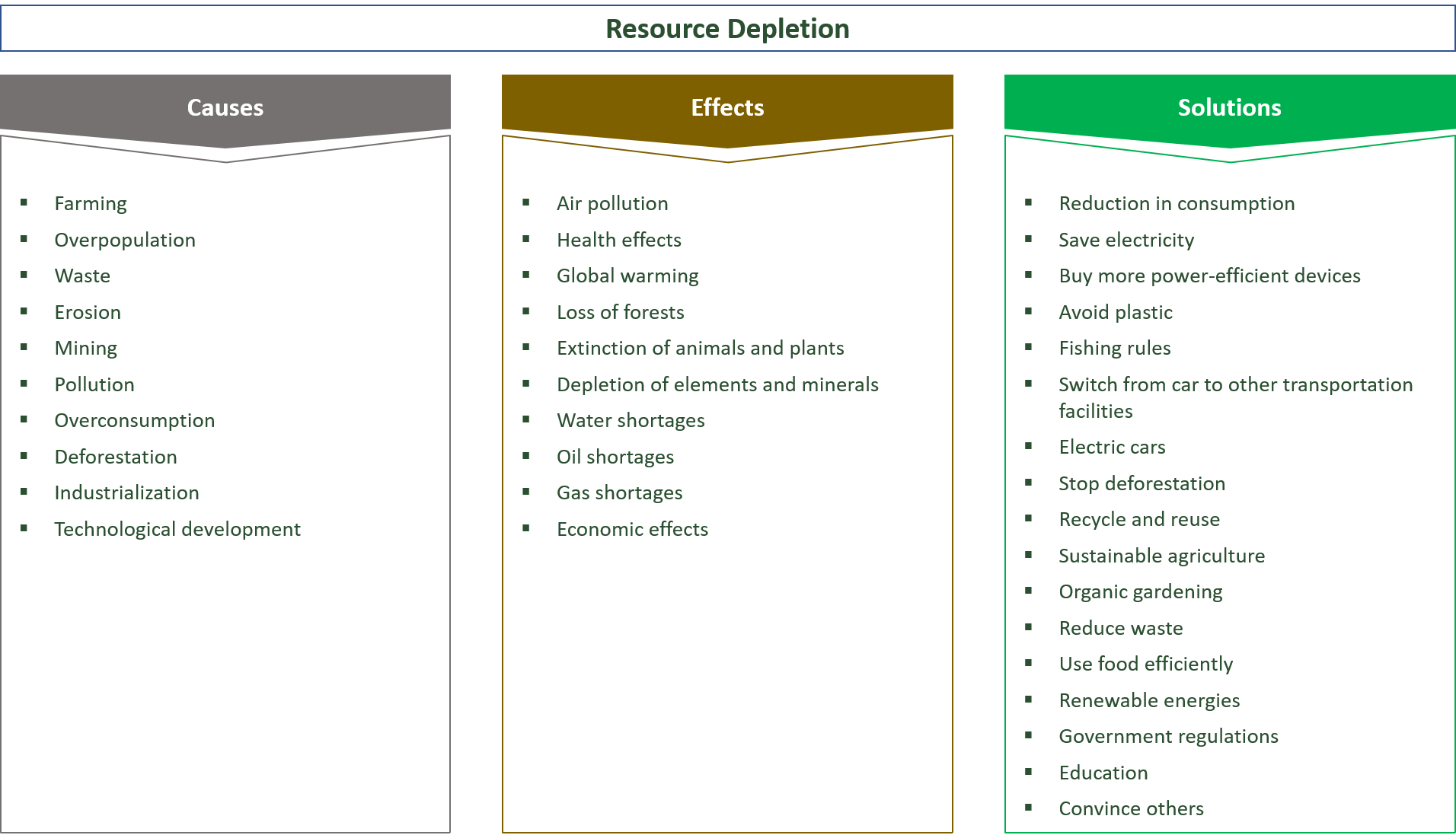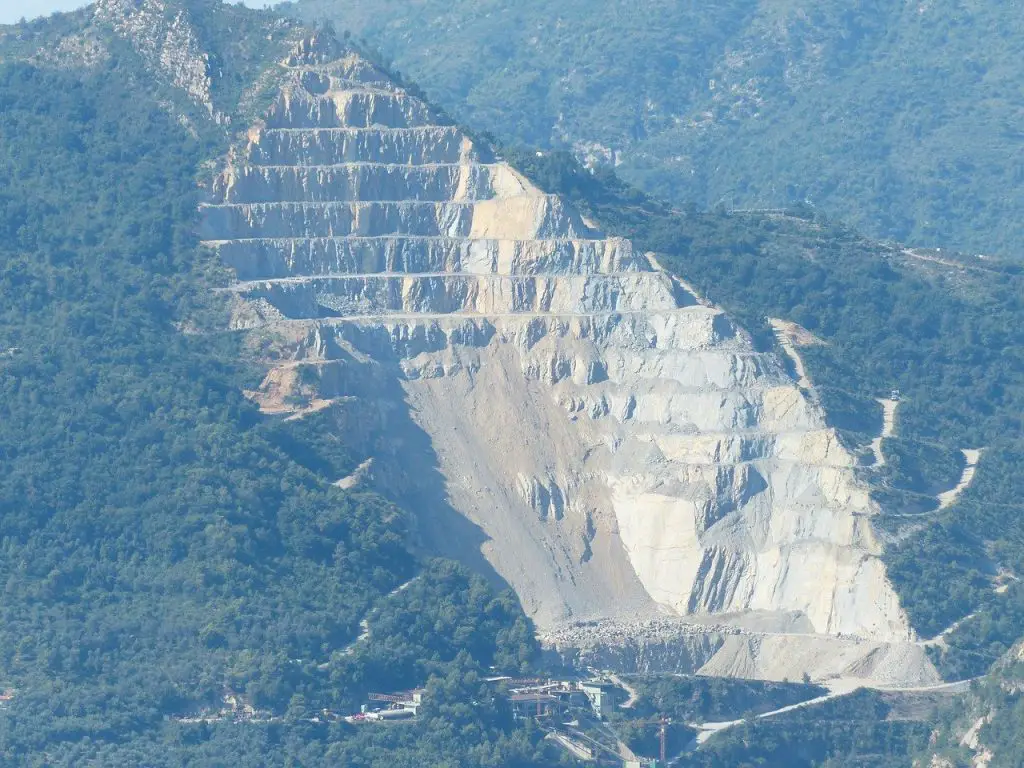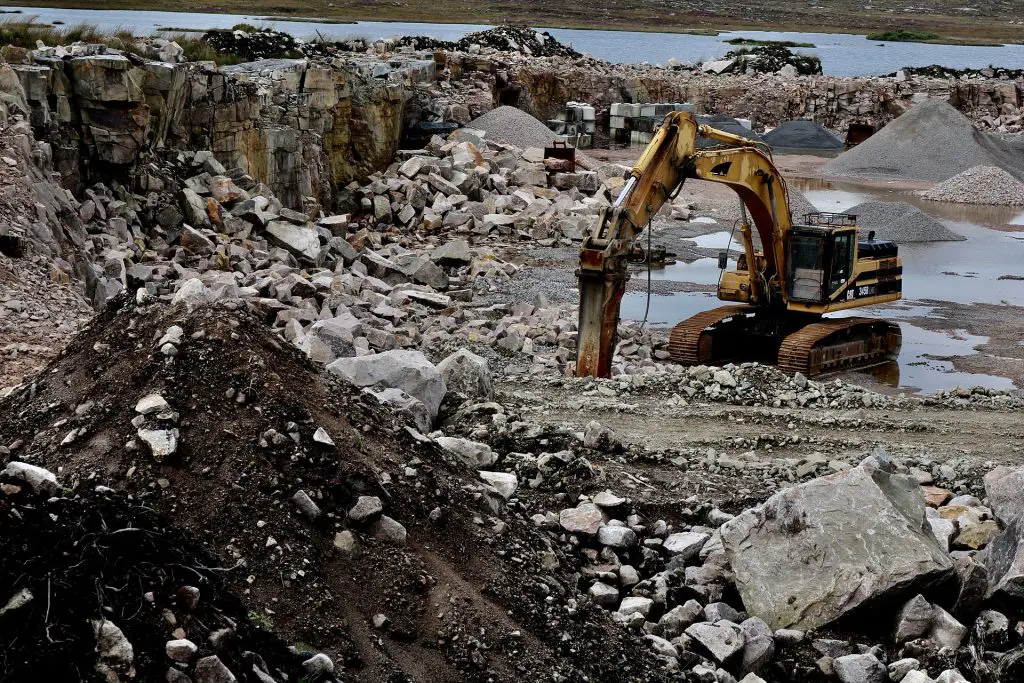“All our efforts to defeat poverty and pursue sustainable development will be in vain if environmental degradation and natural resource depletion continue unabated.”
Kofi Annan
Resource Depletion: Causes, Effects & Solutions

Resource depletion can be defined as the consumption of resources faster than they can be replaced.
Natural resource depletion can be divided into the depletion of renewable as wells as in the depletion of non-renewable resources.
Resource depletion can cause many adverse effects on our environment.
The types, causes, effects of the depletion of resources and solutions to the problem are examined below.
Audio Lesson
Contents
Types of Resource Depletion
- Deforestation
- Mining
- Aquifer depletion
- Contamination of resources
- Slash-and-burn agriculture
- Overconsumption
Deforestation
One major type of resource extraction is deforestation.
Wood is an important material which is used for many different purposes.
Moreover, through deforestation, there is more space for farming purposes.
Mining
Mining is another important type of resource extraction.
We need metals, oil and coal for many industrial purposes.
These resources have to be extracted out of our earth.
Aquifer depletion
Another form of natural resource depletion is groundwater depletion.
Groundwater is an important source for clean drinking water and thus for all life on our earth.
Contamination of resources
The contamination of natural resources can be regarded as resource extraction in an indirect manner.
Though it is not exactly an extraction, it contributes to a shortage of resources since we will no longer be able to use contaminated resources in a senseful manner.
Slash-and-burn agriculture
Slash-and-burn agriculture refers to a method in which plants or trees are cut or burned down in order to create fields for agricultural purposes.
Overconsumption
Overconsumption refers to a state in which we extract too many resources for consumption purposes which results in an unsustainable environmental system.

Causes for Resource Depletion
- Farming
- Overpopulation
- Waste
- Erosion
- Mining
- Pollution
- Overconsumption
- Deforestation
- Industrialization
- Technological development
Farming
Farming can be a severe cause of natural resource depletion.
Due to our growing world population, the pressure to produce enough food for everyone is immense.
This leads to unsustainable farming practices. In the short run, due to excessive use of fertilizers and pesticides, farmers will be able to supply great amounts of food.
In the long run, however, the soil will be harmed due to this farming practices and farmers will have lower crop yields.
The use of heavy machines can also destroy the soil structure, which in turn may also lead to lower crop yields and may even make the soil unfitting for future farming purposes.
Overpopulation
Overpopulation is another cause of natural resource depletion.
We consume many products that are made from natural resources every day.
In order to be able to do that, large amounts of resources have to be extracted out of our earth.
This leads to an excessive incentive to extract too many resources.
Making things worse, an increasing number of people aspires to a consumption-intensive lifestyle right now.
For example, countries that had been quite poor for a long period of time now strive to increase their living standards, leading to an increased consumption per capita.
This further exacerbates the problem of resource extraction.
Waste
How we deal with our waste is another great cause of the issue of excessive resource extraction.
Most of the time, we just throw away our garbage without separating it.
Thus, many precious resources are lost since they will be burnt instead of reusing them.
Erosion
Erosion can also cause resource depletion in the sense that natural resources can be lost due to the erosion of soil.
Hence, these resources may no longer be available for human use in an economic way.
Mining
Mining is another significant cause of resource depletion.
Since in our modern technology-driven world, we need huge amounts of metals and other resources, these resources have to be extracted out of the earth.
Mining is an effective way to do that, however, excessive mining behavior leads to excessive resource extraction and can also harm the local environmental system.
Pollution
Since the industrialization period, pollution levels have significantly increased.
This is due to the fact that we all strive for higher living standards, which also includes an increase in material consumption.
In order to be able to produce the amounts of things necessary to meet the demand, industries have to produce large quantities at scale.
This is likely to result in all sorts of pollution. For example, industrial by-products may not be disposed of properly and rather be discharged in rivers or lakes nearby.
Additionally, through the emission of harmful gases, the likelihood of acid rain increases, leading to an increased level of pollution on fields and in turn may lower crop yields for farmers.
Overconsumption
Overconsumption is a related cause for the depletion of resources.
Since everyone seems to have to follow the newest trends, older things that are still working are often just dumped into the garbage instead of using them.
Thus, this behavior also leads to an increased amount of resources which in turn can lead to resource depletion.
Deforestation
Deforestation is another great cause of resource depletion.
On the one hand, wood is an important material for industrial purposes.
However, even more important, deforestation is often done with the intent to get more land for farming purposes since farming is often more lucrative for locals than selling wood.
Thus, in the Amazonian Rainforest, it is even quite common that farmers intentionally burn down significant areas of land in order to get space to grow soy or other plants.
Industrialization
Through our advances in industrialization, we need an increasing amount of resources to develop new technologies and to supply enough things of our daily lives for all people on our planet.
Moreover, more and more people strive for a materialistic lifestyle and thus the overall resource demand increases dramatically.
If this trend for increasing consumption levels continues, resource depletion at large scale will be the dramatic consequence.
Technological development
Technological development may either save resources or contribute to resource depletion, depending on our intentions.
If we use technological development for the sole purpose to increase our consumption and comfort levels, chances are that we will further deplete our natural resources to a significant degree.
However, if we are able to use technological development to decrease the use of natural resources in the sense that we make processes more efficient, stable consumption levels may be possible by using ever lower amounts of resources.

Effects of Resource Depletion
- Air pollution
- Health effects
- Global warming
- Loss of forests
- Extinction of animals and plants
- Depletion of elements and minerals
- Water shortages
- Oil shortages
- Gas shortages
- Economic effects
Air pollution
Resource depletion can have significant adverse effects on our air quality.
For example, deforestation leads to a higher level of air pollution.
Trees naturally absorb a certain amount of harmful gases and turn them into oxygen.
If there are fewer trees due to deforestation, this beneficial effect of trees is reduced and thus the level of air pollution increases.
Moreover, through industrial processes, the extracted resources are turned into things for our daily use or into energy, which results in the emission of harmful gases and therefore in air pollution.
Health effects
Resource depletion also indirectly contributes to severe health effects.
Since resource extraction causes air pollution, it can in turn cause health issues like lung cancer or other diseases.
Thus, excessive resource extraction also increases the likelihood of severe health conditions.
Global warming
Resource depletion also contributes to global warming in a significant way.
By processing natural resources, harmful gases are emitted into the air.
This includes the emission of CO2 and methane which are quite harmful greenhouse gases.
These gases are known to increase the process of global warming.
Thus, resource depletion also causes global warming and the resulting adverse consequences to our environment.
Loss of forests
Resource depletion, in particular logging and deforestation, lead to a loss of forests.
This problem is especially severe in the Amazonian Rainforest where huge areas of forests have been cut down in the past.
Making things worse, farmers often burn down forests intentionally since they want to plant soy and other crops since it is more profitable for them compared to selling wood.
However, this flawed incentive may result in a huge loss of forest land and thus to further adverse consequences arising from this forest loss.
Extinction of animals and plants
Another related topic is the loss of many animals and plants due to deforestation and other extraction processes.
By extracting resources, we usually destroy the environment of a variety of animals and plants.
These species will have to move to other places.
If they don’t since they are quite sensitive to their living conditions, they may even become extinct due to human intervention.
The depletion of natural resources therefore also increases the endangered species problem.
Depletion of elements and minerals
If the extraction rate of natural resources stays on the levels we currently face, it is quite logical that many precious materials and elements will be entirely depleted in the near future.
If at this point in time, our technology still relies on these materials, we will have a problem since we will no longer be able to extract enough material to meet the supply.
Therefore, switching to renewable resources seems to be the best way to mitigate this issue.
Water shortages
Water shortage will become a quite severe problem in the near future.
Due to industrial processes and the inappropriate disposal of waste, rivers and lakes have already been polluted in a severe way.
Moreover, the global warming issue will further exacerbate this problem.
Water will become a quite precious resource in a couple of years and many people will have to leave their homes due to water shortages.
Oil shortages
Oil is used for many industrial purposes.
All things made of plastic have been manufactured from oil.
Moreover, oil is also needed when it comes to the production of fossil fuels.
The fuel for our cars is produced through the processing of oil.
Thus, we need great amounts of oil in our daily lives.
However, this can lead to a massive shortage or even to the depletion of oil since oil is a fossil resource and will eventually be used up.
Gas shortages
Similar to oil, gas is also used for many industrial purposes and also for heating purposes for our houses.
Since we consume quite high amounts of it on a daily basis, we will likely run out of gas sooner or later.
Economic effects
Apart from the ecological effects, resource depletion also has serious economic effects.
The price for goods, including natural resources, is determined through supply and demand on the world market.
The supply is likely to drop in the future since resources will become scarcer.
Assuming that demand stays constant, this leads to a significant increase in natural resource prices over time.
Especially for poor countries, this would lead to severe issues since they may no longer be able to afford fuel or other materials necessary for technological development and thus the gap between developed and developing countries may get bigger.

Solutions to the Resource Depletion Problem
- Reduction in consumption
- Save electricity
- Buy more power-efficient devices
- Avoid plastic
- Fishing rules
- Switch from car to other transportation facilities
- Electric cars
- Stop deforestation
- Recycle and reuse
- Sustainable agriculture
- Organic gardening
- Reduce waste
- Use food efficiently
- Renewable energies
- Government regulations
- Education
- Convince others
Reduction in consumption
One of the most obvious solutions to the resource depletion problem is a reduction in consumption.
Since the industrial revolution, our consumption levels skyrocketed.
Everyone now needs the newest and the trendiest stuff. Old products that are still working are often disposed of in the garbage and replaced by newer versions.
This leads to a great waste of resources and to an increased speed in the depletion of resources.
In order to mitigate the resource depletion problem, we have to change our consumption behavior in a significant way.
We need trends that make it hip to use things for a quite long time and where the disposal of things is seen as indecent.
Through this approach, we could reduce overall consumption levels significantly and thus also mitigate the resource depletion issue.
Save electricity
Our consumption of electricity is another big issue in our modern society.
Since our lives become more and more focused on electronic devices like smartphones and computers, our energy demand increases constantly.
Moreover, many countries that have former been quite remote to electronic devices now aspire to have a similar lifestyle like industrialized countries.
This will lead to even higher levels of electricity demand. In order to meet this high demand, a greater amount of electricity has to be produced.
Electricity production can be accomplished through different channels.
These include the use of fossil natural resources like coal which in turn leads to a depletion of these natural resources.
In order to meet this problem, we should save electricity in our daily lives whenever possible.
For instance, this could mean switching off the lights when you do not urgently need it or to give up watching TV and instead reading books or playing parlor games.
Buy more power-efficient devices
Due to our technological progress, we have managed to build many energy-efficient devices for our daily lives.
If you need a new washing machine, you should pay attention to the energy efficiency and take this factor into account when you are in the process of deciding which machine to buy.
Similar to the washing machine, there are many devices in our daily lives which can save great amounts of energy if we buy the energy-efficient models instead of old energy-intensive ones.
Avoid plastic
Another measure that all of us can apply in our daily life is to avoid plastic whenever we can.
Plastic is made out of oil.
Since oil is a non-renewable natural resource, the avoidance of plastic means saving natural resources.
We can accomplish this in several different ways.
For example, we could use cloth bags instead of plastic bags.
Moreover, we can avoid the use of coffee-to-go cups made out of plastic.
There are many other ways in our daily lives to save plastic, just pay attention and you will see many opportunities for you to save plastic.
Fishing rules
Fishing quotas are quite important since we have a problem of overfishing in many sea areas.
In order to be able to recover, we have to leave sufficient numbers of fish into the ocean instead of catching them.
Thus, we can assure the sustainability of fishing and the supply with fish in the future.
There are some labels already in place like the MSC-label, which shows that fish with this label comes from sustainable fishing.
Therefore, you could pay attention to this kind of labels when making your buying decision.
Switch from car to other transport facilities
Another way to fight the resource depletion problem is to switch from cars to alternative transport facilities.
You could use public transport instead or even use your bike for short distances.
This would reduce the consumption of electricity or fuel and thus lead to a reduction in resource depletion.
Electric cars
Electric cars are another option for saving natural resources compared to cars using fossil fuels.
Although electric cars are still quite expensive, it is likely that through technological progress, they will be financially affordable for many people in the near future.
Stop deforestation
Another way to mitigate the resource depletion issue is to stop deforestation.
Especially in the Amazonian Rainforest, we have to make sure that governments set strict penalties for deforestation.
We need to recognize how important our forests are for the global environmental system and to protect them accordingly.
Thus, stopping or at least doing deforestation in a sustainable way would mitigate the resource depletion issue.
Recycle and reuse
We can all contribute to mitigate resource depletion through the recycling and reuse of old things.
This could mean giving away stuff you will no longer use to family or friends.
Moreover, it is important to separate your waste in order to be able to recycle it in an efficient way in later processes.
Sustainable agriculture
In our nowadays economy, agricultural processes are often done in an unsustainable way.
Often, excessive amounts of fertilizers and pesticides are used in order to maximize yields.
However, this often harms the soil and will eventually lead to a decline in crop yields.
We have to make sure that farmers have the incentive to grow their plants in a sustainable manner in order to be able to use our farming areas for a long period of time.
Organic gardening
If you have a garden or a balcony, you could grow your own vegetables.
Through this, you will no longer have to buy them in stores.
In this way, you reduce transportation costs which in turn results in the use of fossil fuels.
Thus, through organic gardening, you can make a small impact to mitigate resource depletion issues.
Reduce waste
Since most of our waste is burned and thus resources are lost, you should make sure to produce as little waste as possible.
You can do this in your daily life in many different ways.
For instance, you can buy many products that are not packaged and thus save waste.
Use food efficiently
Great amounts of food are thrown away in our nowadays society.
Even food that would still be suitable for consumption is often disposed of since the best before date had been reached.
In order to prevent resource depletion, we should take more care of what and how much food we buy and make sure that we consume all of it.
Renewable energies
The switch from fossil to renewable energies is a very important step in order to mitigate the resource depletion problem.
Instead of using coal for the production of energy, we could use wind or other renewable resources.
Thus, this would greatly support the resource depletion problem.
Government regulations
To make sure that many measures against resource depletion are implemented by industries, governments have to install effective control mechanisms.
We have to make sure that industries violating sustainable energy standards are financially punished in order to give them an incentive to change their behavior.
Education
A vital part of mitigating the depletion of natural resources is to educate people.
We have to make sure that people understand the adverse impact of resource depletion on our global environmental system.
This education should start quite early.
When we teach school kids about the adverse consequences of natural resource depletion, they are likely to pay attention to this issue also when they become adults.
Moreover, they may also convince their parents to pay more attention to this problem.
Convince others
It is important to make your contribution!
But it is also important to convince other people.
We have to show people how the depletion of resources adversely affects our planet.
Only then, everyone of us has the chance to make a huge difference and to sustain the planet for further generations.
Conclusion
The depletion of natural resources is a big problem.
It has several adverse effects on humanity as well as on the whole environmental system.
There are many measures that can help to prevent resource depletion.
Many of them can be applied by everyone of us in our daily lives.
Together, we can fight resource depletion in an efficient manner if we are willing to contribute our part.
Sources
https://www.msc.org/what-we-are-doing/our-approach/what-does-the-blue-msc-label-mean
https://en.wikipedia.org/wiki/Resource_depletion
https://www.sciencedirect.com/topics/earth-and-planetary-sciences/resource-depletion

About the author
My name is Andreas and my mission is to educate people of all ages about our environmental problems and how everyone can make a contribution to mitigate these issues.
As I went to university and got my Master’s degree in Economics, I did plenty of research in the field of Development Economics.
After finishing university, I traveled around the world. From this time on, I wanted to make a contribution to ensure a livable future for the next generations in every part of our beautiful planet.
Wanna make a contribution to save our environment? Share it!